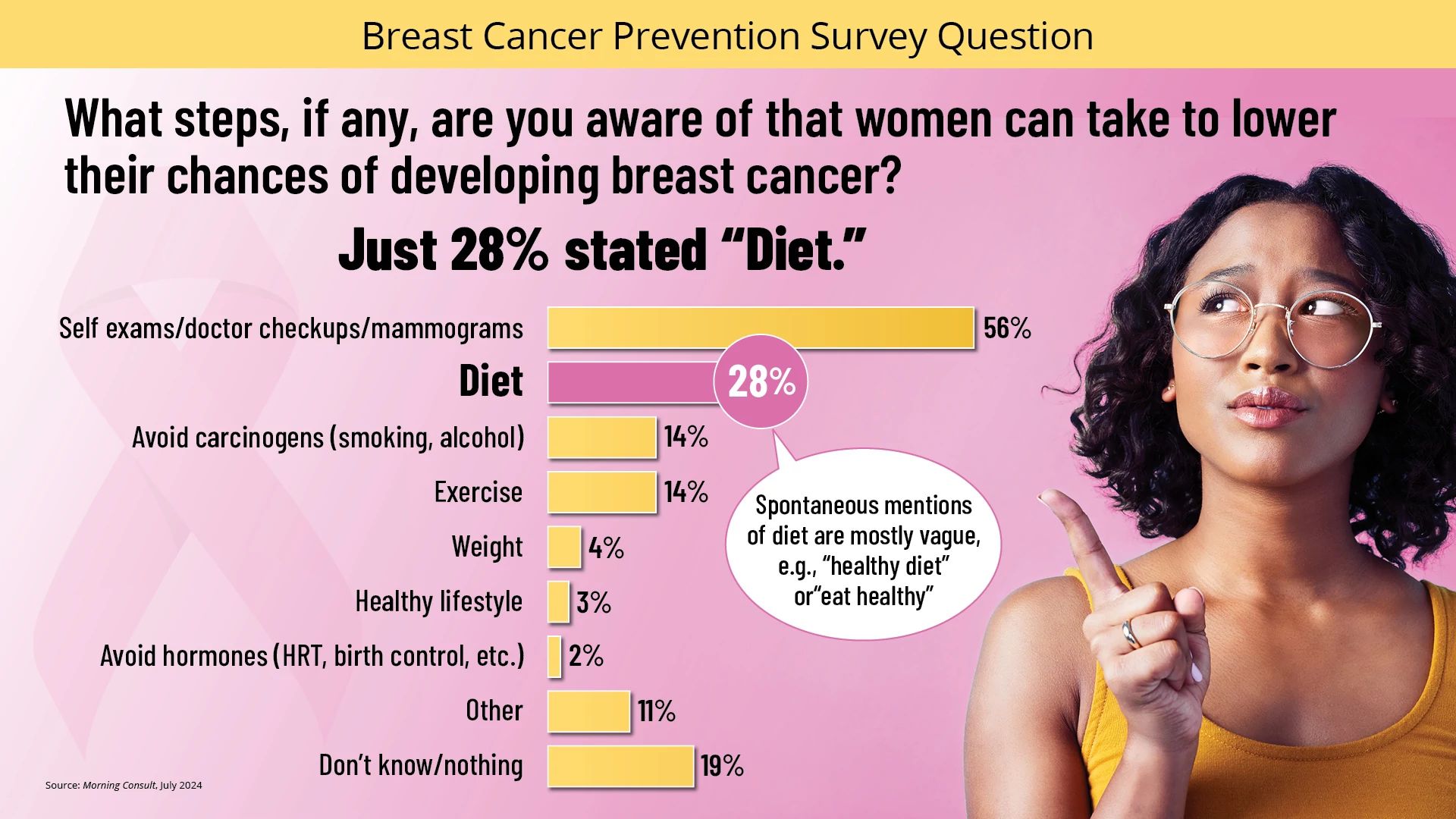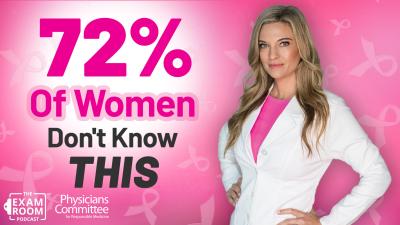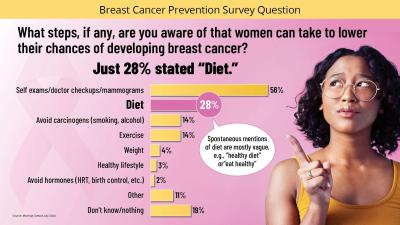Fewer Than 3 of 10 Women Cite Diet When Asked How to Reduce Chances of Breast Cancer
Nationwide Survey Preceding Breast Cancer Awareness Month Also Shows Lack of Knowledge of Protective Benefits of Soy and Harmful Effects of Dairy

WASHINGTON, D.C. ؚ— Just 28% of U.S. women are aware that a healthful diet can lower the risk of developing breast cancer, according to a just-released Physicians Committee for Responsible Medicine/Morning Consult survey.
The poll included 2,017 women interviewed July 25, 2024, to July 28, 2024. When prompted with a follow-up question about which specific foods might reduce breast cancer risk, 23% mentioned vegetables, and 16% mentioned fruits. Only 17% were aware that soy products reduce breast cancer risk, while 16% erroneously said that soy increases the risk of developing breast cancer.
The findings show almost no increase in awareness of preventive steps in recent decades. In a 1995 telephone survey of 510 women, 23% cited dietary factors (reducing intake of fat or meat or increasing intake of vegetables, fruit, fiber, or vegetarian meals) as ways to reduce the risk of developing breast cancer.
Dr. Kristi Funk, a breast cancer surgeon and leading prevention expert from Los Angeles, said,
“It’s clear that millions of women have yet to hear the lifesaving message that what they eat and drink strongly influences their chances of developing breast cancer. Science shows nearly 50% of cases are preventable through diet and lifestyle, at least in theory, and in my opinion, 80 to 90% of cases could be avoided.”
Neal Barnard, MD, president of the Physicians Committee for Responsible Medicine, said, “Public education programs on breast cancer have focused on mammograms, which play a vital role, but are not enough. It is essential to empower people with steps they can take to protect themselves, and a healthy diet is at the top of the list.”
Results of the new survey also show:
•When asked about specific categories that may increase the risk of developing cancer, women were most likely to cite being overweight and high consumption of processed meats. But just 24% said they are aware that high consumption of dairy products increases the risk. Research funded by the National Cancer Institute, the National Institutes of Health, and the World Cancer Research Fund, found that women who consumed 1/4 to 1/3 cup of cow’s milk per day had a 30% increased chance of developing breast cancer. One cup per day increased the risk by 50%, and 2 to 3 cups were associated with an 80% increased chance of developing breast cancer.
•Nearly three quarters (72%) of respondents said they have never received information or education about the link between nutrition and breast cancer from a health care professional.
The Physicians Committee, a national nonprofit health advocacy group of more than 17,000 doctors, recommends a four-pronged approach to preventing breast cancer: Eat a whole food, plant-based diet, exercise regularly, limit alcohol and maintain a healthy weight.
Stephanie McBurnett, a registered dietitian with the Physicians Committee, added, “Research shows that eating a low-fat plant-based diet rich in fruits, vegetables, grains, and beans not only helps lower breast cancer risk. It’s also beneficial for breast cancer survivors.”
Starting in September, community members, and local leaders will join health experts from the Physicians Committee in dozens of U.S. rallies to raise awareness of strategies that can help prevent breast cancer. Several international rallies are also being organized. More information can be found at www.LetsBeatBreastCancer.org.
Note to reporters: To arrange an advance interview with Dr. Funk, Dr. Barnard, or Ms. McBurnett, please contact Kim Kilbride at 202-717-8665; kkilbride [at] pcrm.org (kkilbride[at]pcrm[dot]org)
Media Contact
Kim Kilbride
202-717-8665
kkilbride[at]pcrm.org
Founded in 1985, the Physicians Committee for Responsible Medicine is a nonprofit organization that promotes preventive medicine, conducts clinical research, and encourages higher standards for ethics and effectiveness in education and research.








